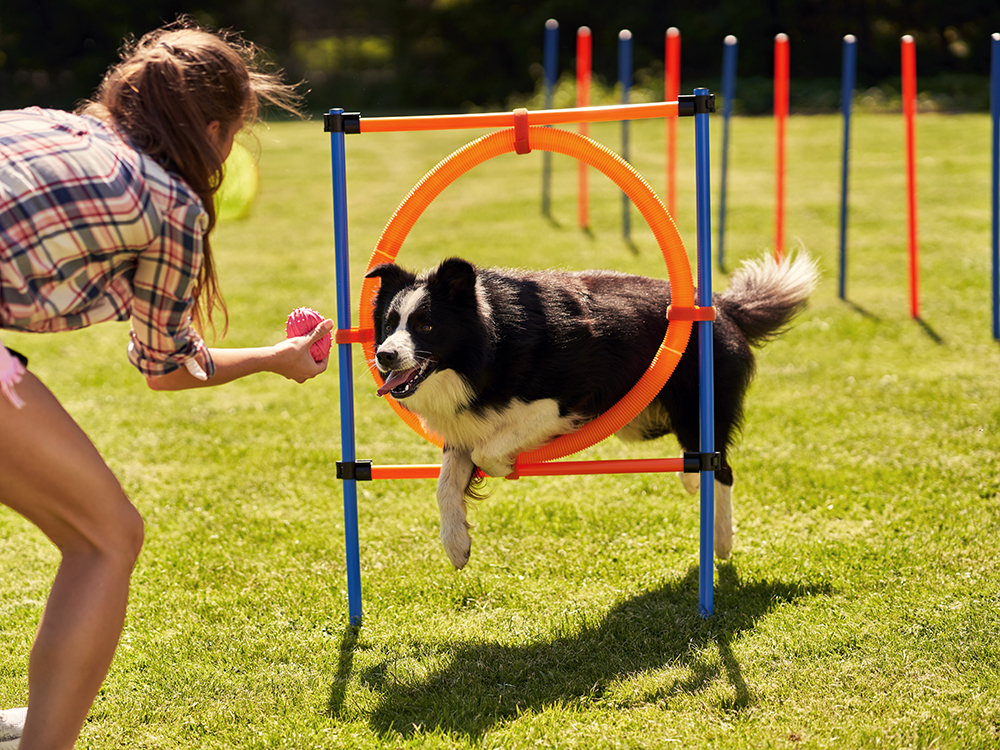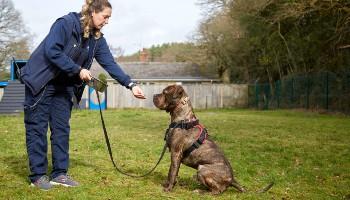The Science Behind Successful Dog Training Techniques
The Science Behind Successful Dog Training Techniques
Blog Article
The Ultimate Overview to Pet Dog Training: Change Your Animal's Actions
Reliable canine training is necessary for promoting an unified connection in between animals and their proprietors. This overview not only aims to equip you with the needed devices to transform your dog's habits yet likewise welcomes you to explore just how these foundational principles can lead to a deeper connection with your pet dog.
Recognizing Canine Actions
Understanding canine actions is necessary for reliable training and an unified relationship between canines and their proprietors. A dog's behavior is influenced by a combination of genetics, atmosphere, and experiences. Dog training. Identifying these factors allows proprietors to tailor their training approaches to fulfill the private requirements of their pet dogs
Canines interact mostly via body movement, articulations, and faces. As an example, a wagging tail can suggest enjoyment or joy, while a tucked tail might signify concern or submission. Observing these cues allows owners to respond properly, strengthening positive behaviors and attending to unfavorable ones properly.
Furthermore, understanding the social structure of pets can supply understandings into their actions. Dogs are pack animals, and they prosper in a structured setting. Establishing clear borders and constant guidelines can stop complication and advertise a sense of security.
In addition, recognizing the all-natural instincts of canines, such as need to dig or go after, is important. These impulses can be rerouted via suitable electrical outlets, such as play or exercise. By adequately recognizing these behavioral elements, proprietors can cultivate a positive training experience, inevitably leading to a well-adjusted and loyal canine companion.
Important Training Techniques
Efficient pet dog training depends on a range of crucial techniques that can substantially boost the learning procedure for both the canine and the owner. One basic technique declares support, which involves gratifying desirable habits with deals with, appreciation, or playtime. This method encourages pet dogs to duplicate the habits that bring about positive outcomes, fostering a trusting relationship between the animal and owner.
One more trick method is consistency in assumptions and commands. Using the same verbal hints and hand signals assists the dog understand what is required, minimizing complication and advertising quicker discovering. Furthermore, developing clear borders and regulations is crucial for effective interaction.
Socializing is likewise an essential component of training. Revealing pets to various atmospheres, people, and other animals helps them create ideal social abilities and decreases stress and anxiety in unknown situations.
Lastly, perseverance and timing are crucial. Training sessions should be frequent yet short, making sure that the canine remains involved and receptive. By employing these crucial techniques, proprietors can produce a favorable and structured training experience that advertises etiquette and reinforces the bond with their canine buddies.
Developing a Training Schedule
Just how can a well-structured training timetable enhance a dog's knowing experience? A training schedule supplies consistency, ensuring that dogs get regular, focused guideline. This predictability assists canines understand what is anticipated of them, reinforcing their discovering and allowing for much better retention of commands and habits.
When producing a training timetable, it is necessary to consider the canine's age, type, and individual temperament. Young puppies might profit from shorter, extra frequent sessions, while grown-up pets may thrive with longer, much less constant training durations. Including a variety of tasks can likewise keep the sessions involving, stopping dullness and promoting interest for knowing.
Furthermore, scheduling training sessions at particular times of the day can help solidify a regimen. Coupling training with everyday walks or play can create a favorable organization with discovering. It is additionally critical to consist of time for support, such as deals with or appreciation, to award desired behaviors promptly.
Last but not least, versatility is key. While consistency is crucial, being adaptable to the canine's state of mind or energy degree can improve their understanding experience. A well-crafted training routine inevitably lays the foundation for efficient communication and a more powerful bond between the dog and proprietor.
Typical Training Challenges
Regardless of having a well-structured training timetable, pet proprietors often experience various obstacles throughout the training procedure. One usual concern is variance in commands and hints. When multiple member of the family use click for more info various terms or tones, a pet may become overwhelmed, impeding its capability to learn successfully.
An additional regular challenge is useful site interruption. Dog training. Pets are naturally curious creatures, and outside stimulations such as various other pets, sounds, or individuals can divert their interest throughout training sessions. This needs owners to create a controlled atmosphere or progressively present interruptions to reinforce focus
In addition, varying power degrees can influence training end results. High-energy canines may have a hard time to settle and concentrate, while much more easygoing breeds could require added motivation to engage. Customizing the training strategy to fit the specific pet's personality is necessary for success.

Building a Strong Bond
A strong bond between a canine and its proprietor is crucial for effective training and overall wellness. Dog training. This relationship fosters trust, which is critical for efficient interaction during the training process. When a pet dog feels connected and protected to its proprietor, it is most likely to respond positively to commands and hints
To construct this bond, uniformity is key. Establishing a regimen that includes regular feeding, workout, and training sessions helps develop a feeling of stability. Additionally, favorable support methods, such as treats, appreciation, and play, reinforce wanted habits while enhancing the emotional link.
Socialization is another crucial element of bond-building. Subjecting your dog to various settings, individuals, and various other animals helps them really feel extra comfy and confident, boosting the bond with their owner. Taking part in activities together, such as strolling, playing fetch, or taking part in obedience training, promotes synergy and mutual enjoyment.
Verdict

Recognizing canine actions is necessary for efficient training and a harmonious connection in between dogs and their proprietors.Effective canine training relies on a variety of vital strategies that can significantly improve more helpful hints the understanding procedure for both the owner and the pet dog.Despite having a well-structured training timetable, canine proprietors typically run into various obstacles throughout the training process.In verdict, reliable canine training relies on a detailed understanding of canine habits, the application of crucial techniques, and the establishment of an organized training routine. By stressing favorable support and consistency, pet dog proprietors can dramatically enhance their animals' habits, ultimately guaranteeing an unified partnership and advertising the well-being of both the pet and its environment.
Report this page